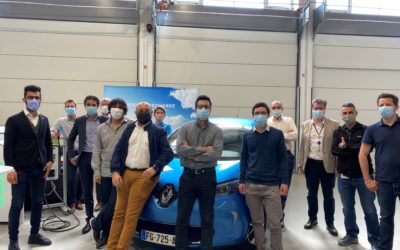VEDECOM’s self-driving shuttles are one year old
On 10th December 2019, VEDECOM celebrated the first anniversary of its extended-perception self-driving shuttles operating in the Satory district of Versailles. The two vehicles serve the last kilometre of the journey for employees working on Satory’s Allée des Marronniers road, which is open to regular traffic. Here’s a review of their first year of service, demonstrations and experiments.
More than 10,000 km covered by these first extended-perception self-driving vehicles to operate on open roads in France
Having covered precisely 10,463 kilometres, VEDECOM’s self-driving shuttles Framboise and Litchi – as they are affectionately known – are now a familiar sight around the Satory area. 4,533 passengers have been carried, without incident, at speeds of up to 18.997 km/h. 81.5% of those surveyed claimed to be completely satisfied. The vehicles themselves – EZ 10 shuttles, produced using EasyMile technology – are operated by VEDECOM Tech, VEDECOM and the Paris-Saclay region, and operated by Transdev.
. It is the first extended-perception self-driving vehicle service to operate on open roads in France. The shuttles satisfy two purposes: firstly, serving passengers, whose daily mobility is improved by their “last-kilometre” coverage; and secondly, research, for which they serve as a useful tool for observation and research.
A year of continuous progress
In the year since their inauguration on 10th December 2018, the Framboise and Litchi shuttles have passed many milestones. Initially restricted to 15 km/h, they were upgraded to 18 km/h on 1st February 2019. This speed-up was closely followed by the implementation of the BlushMeUp smartphone app, offering an interface for streamlining journeys: geolocation of shuttles, viewing timetables, calculating journey times in real time, etc. The road infrastructure was also modified to adapt to these new vehicles and enable the installation of extended perception (installation of perception sensors along the roadside). Lastly, a monitoring system was set up. The shuttles now operate in “metro” mode, stopping at every station along their route. 2020 will see the development of an “on demand” mode.
Research results to benefit the deployment of future self-driving shuttles
These various improvements have yielded vitally useful information for the deployment of future self-driving mobile solutions. It was observed that the increase in speed went hand in hand with a reduction in the number of safety stops, resulting in a higher acceptance rate and service improvements. The first version of the extended-perception system has allowed possible problems to be anticipated, and is thus contributing to greater road safety.


Growing recognition
Following these progressive improvements, VEDECOM’s self-driving shuttles have also been guests at a number of events. From 4th-6th May 2019, they were on display in front of the Versailles Grand Parc local government organisation’s offices as part of the first Architecture and Landscape Biennale, organised by the Ile-de-France region. This gave the VEDECOM Tech team the opportunity to introduce the Satory district’s self-driving shuttle service to the public. And on 24th October, the Framboise shuttle was out and about again, being demonstrated at the ALD’s BlueFleet day at the Linas-Montlhéry racing circuit, alongside VEDECOM’s self-driving Zoé car. It was an opportunity for a huge audience of non-experts to see self-driving technology up close. Lastly, the shuttles were demonstrated at the Ministry of the Economy and Finance’s Cour d’Honneur in Bercy on 2nd December at the Automotive Industry Day organised by the PFA (Plateforme française de l’Automobile).
All in all, a packed first year for Framboise and Litchi… and we hope their second will be equally fruitful!
Articles récents :
European 5G-MOBIX Project French site Demonstration and Seminar
5G for connected and automated cooperative mobility: towards greater safety and efficiency 21 April 2022, 9 AM - 6 PM Organisation : VEDECOM, Catapult, AKKA Technologies and VALEO Location: VEDECOM headquarters at mobiLab and Satory tracks, Versailles. 23 bis allée...
E-mobility: a successfull demonstration of the Certificate Trust List for Plug & Charge interoperability
The Certificate Trust List has been demonstrated on the 2nd of June 2021 as a technical solution for ISO 15118 Plug and Charge interoperability. The objective is to simplify the user experience wherever he is and guarantee the interoperability between any vehicle and...
“Machine Learning for the distributed and dynamic management of a fleet of autonomous taxis and shuttles”
Thesis defence of Tatiana BABICHEVA « Machine Learning for the distributed and dynamic management of a fleet of autonomous taxis and shuttles » 10 mars 2021 - 9h30 Online : Zoom Follow this event : [button...



